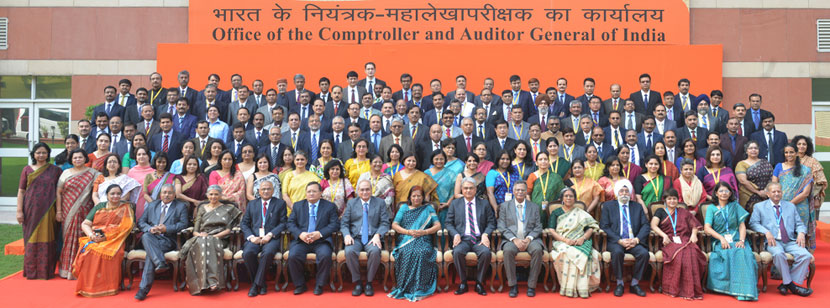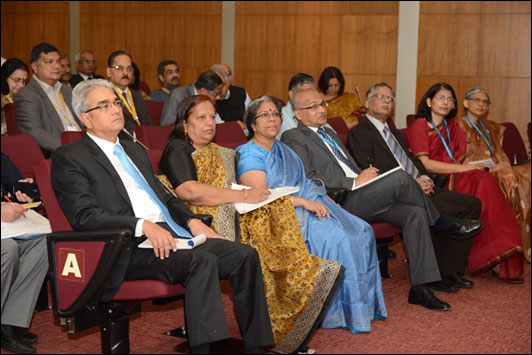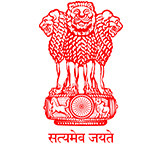XXVIIth Accountants General Conference, 2014
Highlights

Indian Audit and Accounts Department (IA&AD), headed by the Comptroller and Auditor General of India, constantly strives to discharge its professional duties, both as an auditor and an accountant, in accordance with the international best practices. Today auditors are seen as partners in upgrading the governance and audit reports serve as an aid to the Government. In the public domain, there is an increasing awareness and demand for transparency and accountability in public sector service delivery. The Comptroller and Auditor General is seen as the agency which is mandated to keep a watch on economic, efficient and effective governance. The foundation of sound governance with accountability rests on a system of robust public financial reporting.
The IA&AD regularly organizes seminars, conferences and workshops to adapt and upgrade professional practices, structures and methods of functioning. The Accountants General Conference is a prime platform where the entire top level management of the IA&AD come together to review, discuss and recommend the direction in which the IA&AD needs to move in order to deliver its mandated duties in the best possible manner. It offers a forum for exchange of ideas, grappling with evolving issues and experience sharing.
The biennial Conference of all senior officers (Accountant General/Principal Director level and above) of the Indian Audit and Accounts Department offers a forum for exchange of ideas and experience for grappling with evolving issues.
The 27th such Conference was held during October 27-29, 2014. The theme of the Conference was 'Promoting Good Governance and Accountability through Public Audit'. Nearly 170 senior officers of the Department participated in it.

President of India inaugurated the Conference on 27th October at 12 noon. Mrs Sumitra Mahajan, Speaker and Prof. K V Thomas, Chairman, PAC graced the inaugural function.

On October 28, 2014, a panel discussion was organised as part of the Conference on "Reporting for Public Interest: Value and Impact of CAG's Audit". Shri K. M. Chandrashekhar, former Cabinet Secretary, Dr.Bibek Debroy (eminent economist), Shri H. K. Dua (eminent journalist and MP) and Shri Anand Mahindra (eminent industrialist) were the panellists. Shri Subrat Das, Executive Director of the Centre for Budget and Governance Accountability had prepared the background paper for this session.
Valedictory Address was delivered by Shri Arun Jaitley, Hon. Finance Minister on October 29, 2014.
During the conference, the participants deliberated on the following 4 sub-themes in 4 different Groups:
- I. Emerging Areas of Audit
- II. Measuring the impact of Audit
- III. Capacity Building in IA&AD
- IV. Challenges for Accounts & Entitlement offices
I. Emerging Areas of Audit
The CAG's audit jurisdiction covers the Central and State governments, Central and State Public Sector Undertaking where Governments are majority shareholders, Government financed Autonomous Bodies. With changes in governance structures, the methods of financing infrastructure and public services also undergo changes. Besides, a limited examination of private sector entities controlling public resources under licenses or contracts is also entrusted to Audit. All such evolving developments which impact audit resources are called emerging areas of audit.
II. Measuring the impact of Audit
The CAG Reports are submitted to the Parliament and State Legislatures through the respective Governments. Some Paras of these Reports are discussed by the Public Accounts Committees or the Committees on Public Undertakings of these Legislatures. The current Audit Reports also give some statistical information on the follow-up action taken by the governments on the previous CAG Reports. Such analysis of what action was taken on the Audit Report is called measuring the impact of Audit.
III. Capacity Building in IA&AD
The CAG has a vast jurisdiction to audit a wide range of entities at home and abroad. The CAG of India has been appointed a Member of the Board of External Auditors for the United Nations and is responsible for audit of a number of International Organizations. Auditing is a knowledge-intensive activity and the Department has excellent training facilities using latest modern technological tools so that the officials at different levels in the Indian Audit and Accounts Department keep their knowledge and skills uptodate. Such aspects of management are covered under capacity building.
IV. Challenges for Accounts & Entitlement offices
The Indian Audit and Accounts Department is responsible for compiling the accounts of State governments. In some States, it is also responsible for authorization of pension and/or maintenance of General Provident Fund accounts of Government employees. These offices continuously strive for improving the quality of services rendered to the governments and government employees through increasing use of Information and Communication Technology.
|







